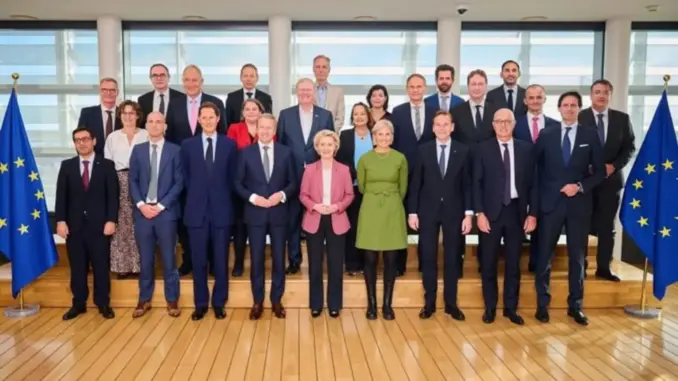
A top-level industry summit in Brussels on Friday reaffirmed the unmistakable strategic emphasis on electric vehicles in Europe.
“Whatever happens, the future is electric,” someone familiar with the discussions between EU Commission president Ursula von der Leyen and senior automotive executives told reporters.
“The industry is highly conscious of the need to shift,” the source, who requested anonymity, added.
Ahead of the meeting, European carmakers had pushed for more leeway in applying CO2 targets.
“But even if the Commission relaxed these targets, global competition would impose them on the sector,” the source said.
Brussels is pursuing the aim of becoming climate neutral by 2050 and has, among other measures, decided to phase out new combustion-engine vehicles by 2035.
In Friday’s discussions the Commission appeared unwilling to budge on the 2035 targets despite recent appeals from business and political circles to abandon this objective.
“I know of no better technology than the electric car for progressing CO2 reduction in transport in the coming years,” Audi CEO Gernot Döllner told German magazine Wirtschaftswoche.
Rather than highlighting these benefits, fresh debates about preserving the combustion engine keep being launched – ”this is counterproductive and unsettles customers”, he added.
A comparable perspective was expressed by Michiel Langezaal, CEO of Fastned and president of ChargeUp Europe, who took part in the talks with von der Leyen.
“Ensuring that Europe can lead the e-mobility transformation worldwide requires more than firmly sticking to a roadmap. It demands that industry have the courage to approach the problems we face with a growth mindset and concentrate on the measures necessary to make the shift to e-mobility a success for people, industry and the environment,” he said.
The Commission had called the three-hour meeting as part of the “Strategic Dialogue” on the future of the car industry to tackle the current crisis. It was the third such meeting since the start of the year.
The continent’s car sector has been hit hard and is coping with weakening sales, high energy costs, rising subsidised competition from China and a hostile trade environment due to US punitive tariffs.
Back in April, EU industry chief Stéphane Séjourné had described the sector as being “in mortal danger”.
“There is a risk that the future map of the global car industry will be drawn without Europe,” Séjourné said then.
One of the largest challenges remains implementing European climate policy.
“The market share of battery electric passenger cars in EU-27 was at 15.6% and at 9% for vans. Widespread mass-market adoption has not occurred yet. And it will not happen if we don’t accelerate infrastructure and reduce the total cost of ownership,” Sigrid de Vries, director general of the European Automobile Manufacturers’ Association (ACEA) told reporters.
“But governments and regulators have not invested in, nor required, adequate levels of infrastructure and grid upgrades and incentives remain uneven. The consequence: the regulatory targets are no longer attainable,” she added.
For zero-emission vehicles to become the obvious option for consumers and businesses, carmakers believe that buying or operating these vehicles must be more appealing than those with internal combustion engines.
That demands consistent purchase incentives, fairer taxation, lower charging costs and easier access to urban areas.
At the same time, Europe must speed up charging and refuelling infrastructure, especially for heavy-duty vehicles, while modernising grids and reforming energy markets to bring down electricity prices – this is one of the industry’s key demands.
European car bosses have recently challenged the 2035 combustion engine ban timeline, highlighting the ongoing debate.
The automotive sector, a pillar of the European economy, employs over 13 million people (direct and indirect jobs) and contributes roughly 7% to the EU’s GDP.

Leave a Reply